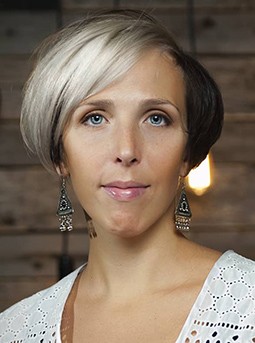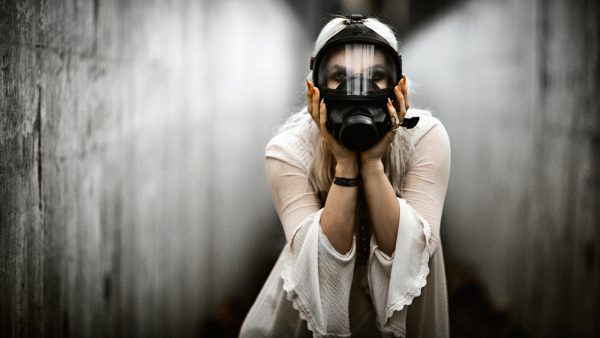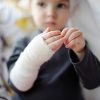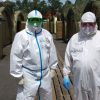 Anxieties and fears associated with the pandemic are not diminishing. Scientists are sounding the alarm: mental disorders that occur to anxious people due to the coronavirus have already been combined into one group and called the general term “coronaphobia”. People continue to go to psychologists, and neurotic symptoms are noted by specialists around the world. Pravmir studied a Medscape article and asked for comments from experts from Russia.
Anxieties and fears associated with the pandemic are not diminishing. Scientists are sounding the alarm: mental disorders that occur to anxious people due to the coronavirus have already been combined into one group and called the general term “coronaphobia”. People continue to go to psychologists, and neurotic symptoms are noted by specialists around the world. Pravmir studied a Medscape article and asked for comments from experts from Russia.
Researchers have now formalized a definition of the long-term mental maladies associated with the pandemic, collectively deeming them “coronaphobia.” The term is a catch-all phrase for the fear and the emotional and social strain experienced by the general public in response to COVID-19, according to Medscape. Obsessive behaviors, distress, avoidance reaction, panic, anxiety, hoarding, paranoia, and depression are some of the responses associated with coronaphobia. On the surface, these appear to be normal, somewhat fitting reactions to this surreal and frightening moment in time. However, for those experiencing coronaphobia, they are distinctly maladaptive and harmful. “We had a serious rise in the use of our services, notably the helpline and email enquiries,” explained Sarah Floyd, the volunteer advisor of the UK-based organization No Panic. “It has been up and down all along, but more of an up since lockdown is easing.”
During normal times, the charity organization No Panic offers itself as an easily accessible service to those with anxiety disorders and phobias. COVID-19 cases peaked in the United Kingdom in early April. Nationwide lockdown efforts contributed to a gradual but ultimately substantial decline in cases, yet, despite the favorable trend lines, No Panic has remained busier than ever.
The group’s experience offers yet more evidence that the anxieties and fears caused by this global pandemic don’t flatten alongside the curve but instead linger as chronic problems requiring ongoing care.
“Every week in my clinic, I’m seeing people who are experiencing more anxiety and hopelessness and having an emotional response that is perhaps out of proportion to what one would expect, which is directly related to what is going on in the world right now with coronavirus,” said Gregory Scott Brown, MD, founder and director of the Center for Green Psychiatry in West Lake Hills, Texas. “Simply put, I think what we are looking at is adjustment disorder. That is probably how the DSM would define it.”
Adjustment disorder is one of the most frequently diagnosed mental health conditions, although it is also relatively understudied. It is really a set of disorders that follow in the wake of a significant stressor, which can vary from serious illness or the death of a loved one to relocating or experiencing work problems. The resulting dysfunction and distress that the person experiences are considered out of proportion in duration or scale with what would normally be expected. Diagnosing an adjustment disorder is made difficult by the lack of a valid and reliable screening measure.
Coronaphobia: What Is Happening in Russia
The most vulnerable to coronaphobia are people who already have an anxiety-phobic disorder (for example, panic disorder, agoraphobia, etc.), psychiatrist Pavel Alfimov told Pravmir.

Pavel Alfimov
– The risk of developing neurosis is relatively high in people with severe chronic diseases, as well as in people who find themselves in a difficult life situation without a supportive social environment. An important factor is the personality type. For example, in a situation of a global pandemic and a growing socio-economic crisis, perfectionists feel the worst: they do not tolerate uncertainty and constantly changing circumstances of life.
According to the doctor, a person who has been in a state of anxiety for a long time will sooner or later feel exhaustion: both physical and moral.
– Anxiety is an adaptation mechanism that mobilizes our resources. This can be useful in the short term (in fact, it will help to adapt to any stressful factor). However, we cannot stay in this state for a long time. This is due, in particular, to dysfunction of the hypothalamic-pituitary-adrenal axis: the system responsible for responding to stress.
The symptoms of nervous exhaustion are understandable and familiar to almost anyone. Everyone experiences something similar after a viral infection or severe fatigue. These are irritability, absent-mindedness (decreased concentration of attention), poor tolerance of loud sounds or bright light, decreased performance, insomnia, decreased appetite, tearfulness, mood instability, etc. With prolonged exhaustion, the body’s immune reactivity can also be disrupted – herpes rash worsens, a person gets sick more often ARVI.
In Russia, the International Classification of Diseases of the 10th revision (ICD-10) is in force. According to it, people who have the symptoms of coronaphobia can be diagnosed as an adjustment disorder, an isolated phobia or mixed anxiety-depressive disorder, as well as another diagnosis from the category of neurotic disorders.
Specifically, not only those who were initially impressionable, suspicious and anxious, but also many other people were involved in coronaphobia, psychologist Victoria Naumova told Pravmir.
– This happens both due to the real threat brought by the covid, and due to mutual induction. That is, coronaphobia has ceased to be a narrow, specific phobia (such as fear of spiders or travel in an elevator), but is of a worldwide nature. And here each person will project their basic fear. For some, this is a story about a real threat to their own life and health, for others it is about fear for loved ones, others fear serious financial losses, fourth fear for family relationships and exacerbation of problems during self-isolation, etc.
Since they speak openly about these and other problems and threats, keep statistics, publish emotional stories and photo reports, everyone begins to react in their own way. And the more options a person has for solving pressing issues, the more useful acquaintances he has (including for solving health problems), the more benevolent and supportive environment in the family is, the more chances of meeting a threat in a more stable state he has. And vice versa.
The main danger of coronaphobia is a decrease in the quality of one’s own life, that is, a change in lifestyle and the appearance of physically unpleasant symptoms due to a disturbed sleep and wakefulness regime, insomnia, and concomitant new eating habits (when a person does not want to eat, or, conversely, begins to “eat” stress), there is a dependence on alcohol, a manifestation of closeness and ostracism, the psychologist notes.
– Usually the reactive anxiety caused by some event goes away on its own after some time. If the anxiety continues for a long time (and in the case of coronavirus, it is an invisible, but quite obvious in terms of the consequences threat), then fear becomes the main emotional background of a person. This fear is characterized by one’s own explanations for its causes. In the foreground there are such characteristics as a strong intensity of experiences, their duration of more than 6 months, real changes in the lifestyle (and in the mode of self-isolation they were inevitable), the phenomenon of generalization, when the feeling of anxiety begins to spread to other areas of life, which in a situation with the coronavirus, too, turned out to be inevitable, imagining a worst-case scenario, deliberately avoiding or denying the fact: for example, sabotaging quarantine measures, and, in general, a feeling of insecurity and anxiety.
How to Deal With Coronaphobia
To cope with neurosis (anxiety disorder), it is important to take care of yourself in a broad sense, psychiatrist Pavel Alfimov explains.
– It is necessary to observe the correct regime of work and rest, go to bed on time and get up on time, eat right, engage in aerobic physical activity.
It is important to be able to receive non-judgmental support and validation of your feelings from loved ones.
A short-term psychological counseling is a good idea. Herbal sedatives can have a noticeable effect on mild neurotic conditions. In more severe cases, when a person’s adaptation is impaired (for example, the ability to work is lost) or any serious symptoms appear (pain, psychogenic dyspepsia or vomiting, skin reactions, etc.), you should consult a specialist: a psychotherapist in a polyclinic or a doctor- psychiatrist.
The difference between “normal” and “abnormal” anxiety, when it is time to see a specialist, is not easy to find on your own, psychologist Victoria Naumova is sure.

Victoria Naumova
– What can we do on our own? We can track how the condition affects (if it does) sensations in the body and the appearance of some unusual sensations; how it affects the ability to rationally think, perceive, remember information; and the main emotional background. We can listen to ourselves: what emotions are most often manifested, what behavioral features have appeared that did not exist before.
The psychologist advises to assess your condition on a ten-point scale:
- if the emotional state is so strong that it does not lend itself to any independent control (9-10 points), seriously affecting the usual way of life, then the help of a psychiatrist and medication support is needed.
- If the level of fears is 4-6 points, the help of a psychologist or psychotherapist is needed. If high anxiety is presented in the form of a formula, then it will look like this: overestimation of danger (due to the so-called “thinking errors”) + underestimation of personal coping (subjective experience of helplessness coupled with uncertainty) = high anxiety.
- If the level of anxiety is 2-4 points, various self-adapted exercises from the cognitive-behavioral approach may be appropriate. It is necessary to understand which thoughts affect the underlying fear. These thoughts can be influenced through reformulation and rethinking. Even today, there are many offers for group support.
Your Loved Ones Have Coronaphobia: How to Help
Neurosis can happen to any person, no one is immune from this, psychiatrist Pavel Alfimov says. Sometimes, to relieve its symptoms, it is enough to talk calmly and provide basic support, for example, help with everyday problems, especially when it comes to the elderly.
“If your loved ones have signs of an anxiety-phobic disorder (for example, associated with coronavirus infection),” psychiatrist Pavel Alfimov says, “I would recommend providing them with “rational” support. In other words, share with them the confidence they already lack.
It is correct to comply with reasonable security measures recommended by the Ministry of Health. Washing all surfaces with alcohol three times a day is wrong and tiring. Observing the regime of social distance and isolation in accordance with the instructions of the authorities is correct. Staying at home without getting out and disappearing from the world is wrong and counterproductive.
Also, if you suspect excessive anxiety in a loved one, and it is clear that he himself suffers from this, you can arrange for him to consult with a specialist in the field of mental health, psychologist Victoria Naumova advises.
– Now it can even be done online. Find out if the specialist has anxiety management skills. If psychiatric help and medication support is needed, then it is better to combine it with psychotherapy.
According to recent publications, coronaphobia may be more susceptible to people who feel vulnerable to illness, prone to anxiety, or unable to deal with uncertainty. During the period of quarantine, isolation and self-isolation, existing mental health disorders can also exacerbate, which can lead to panic attacks, chronophobia (fear of the passage of time) and the development of suicidal tendencies.
Translated by Alyona Malafeeva

















